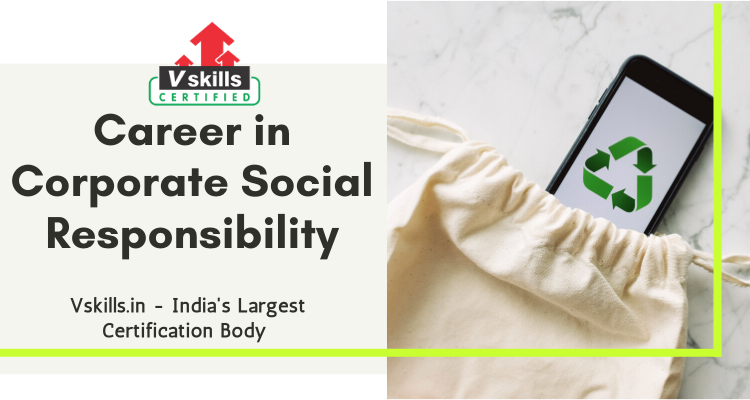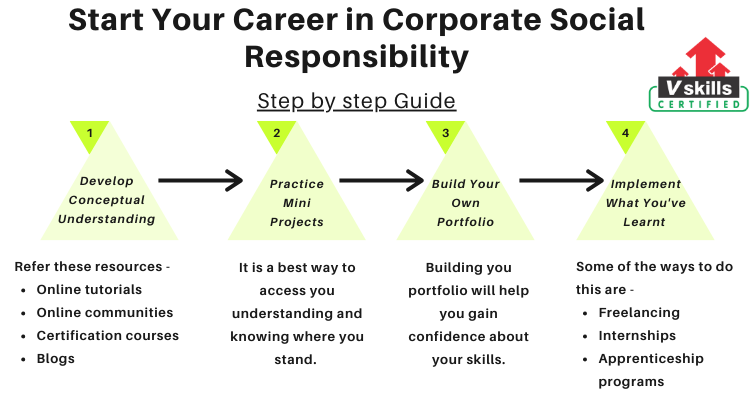Corporate social responsibility or CSR is basically a concept in which businesses pledge to spend a certain amount of their net profit to contribute to a healthier community and a safer world, either willingly or as a result of legislation. Companies specially employ candidates who are professional in this field to meet the minimum CSR requirements. This field can prove to be very lucrative career opportunity for you.
Let us analyse Career opportunities in Corporate Social Responsibility!
What is Corporate Social Responsibility?
CSR refers to a company’s operations and tools for focusing on the triple bottom line: people, planet, and profits. Fair pay programmes, promoting employee volunteerism, supporting non-profits that benefit the world, and practising resource and environmental protection are all examples of this. It’s a vast and rapidly expanding sector.
Why to choose working in this field?
The reasons for which this field might be a right fit for you are as follows –
- CSR should be at the top of your list if you want a job that makes you feel comfortable. You’ll contribute to the development of a socially conscious organisation while still supporting your own. CSR focuses on positive results, whether it’s through conservation projects, philanthropy, or community volunteering.
- You’ll use and improve a wide range of transferable skills as a CSR professional. Many of the skills you honed as a student or intern will serve you well in this area. Study, public speaking and presentations, writing, and good interpersonal skills are among the most important skills for Corporate Social Responsibility.
- Working in CSR helps you to be inventive, imaginative, and forward-thinking. CSR is an area that is always evolving, and there is always space for new ideas and perspectives. Conferences and exhibitions, both domestic and international, are excellent ways to keep current in your profession.
How can you start your career in Corporate Social Responsibility?
To be acceptable at something, it is critical to have a good start with appropriate assets and learning content. As a result, in order to be a pro in this area, your first steps toward learning must be appropriate. Let’s take a look at some steps you can take to start your learning process –
Step 1 – Learn about the basics and Develop Conceptual understanding
You must first establish a stable foundation before you can become an expert in those fields. And you’ll need to have the right applied skills before you can move on to the practical labs. Everything has to begin somewhere. You must begin small if you want to have a successful career in this field. You may use the following tools to get a complete understanding of the domain:
- Firstly, Online Tutorials for Corporate Social Responsibility
- Also, Certification Courses from verified sources such as Vskills, Coursera, Udemy and so on.
- In addition, Online communities
- Moreover, Blogs and study material from experts in this field and many more.
Vskills also provide Online tutorials, certification courses and free practice tests for the same. You can check them out on our official site.
Step 2 – Practice Mini Projects
If you want to land in a good position, you must practise. It’s also a perfect way to see where you are in terms of putting your knowledge into effect. In practical aspects such as the application of Corporate Social Responsibility in ventures, experience will help you outlast other things. To better understand the practical aspects, you can supplement your learning by reading blogs and tutorials on various websites. You can also attend various conferences – domestic as well as international and various webinars in order to polish your skills.
Step 3 – Build Your Portfolio
Building a portfolio will help you gain trust in your abilities while also giving you a place to practise what you’ve learned. Your portfolio shows the ability to prepare and execute various codes, as well as the quality of your Corporate Social Responsibility skills. These tasks can provide a variety of datasets and provide readers with interesting tidbits of knowledge gleaned from your research. Your portfolio doesn’t have to be about a single subject; pick a few that interest you and see what you can do with them.
Step 4 – Implement your skills in Real world
It’s important to practise your skills, which is why you’ve spent so much time learning how to do it perfectly! It’s also important that you stay up to date and continue to improve your own skills. Some specialist courses may also be used to show advanced abilities. You are also welcome to attend. Here are some examples of how you can improve your abilities:
- Freelancing
- Internships
- Apprenticeship programs
The above steps will help you to get this domain started. It’s a long way to go, however. You can take an advanced course to reach a new level of skills.
Career opportunities in Corporate Social Responsibility
Some of the job roles you can expect after getting into this field are –
Corporate social responsibility Coordinator – This role reports to the Manager, Corporate Social Responsibility, and is responsible for collecting sustainability information and conducting research both internally and externally in order to prepare CSR reporting documents.
Corporate social responsibility project manager – You will lead our early strategic alliances, brand collaborations, and stakeholder communications linked to a global Sustainable Development Goal strategy as the Manager of Partnerships and Engagement.
Senior Corporate Social Responsibility Specialist – This role will work alongside the Director of Communications and the executive team to develop and execute a robust CSR programme that will have a meaningful social, economic, and environmental effect.
Skills
Desirable skills for a CSR professional include:
- A strong commitment to corporate social responsibility and long-term sustainability
- Communication abilities that are high
- Ability to think logically and analytically
- Sensitivity and comprehension
- Understanding of how companies work.
Market Demand
Corporate Social Responsibility Professionals are in great demand. Companies specializing in social work or corporate social responsibility outsourcing are constantly hiring skilled corporate social responsibility professionals. Various public and private companies also need corporate social responsibility professionals for their corporate social responsibility departments. Top companies that hire CSR professionals are –
- HP
- Cisco
- Dell
- Intel
- Microsoft
- NVIDIA
- Citigroup
- General Mills
- Comerica
- Jones Lang LaSalle.
Average Salary
Individuals’ career paths are determined by a variety of factors, including their expectations for remuneration. Working in an organization’s CSR wing will result in the following types of remuneration:
- Junior level: Rs 5 lakh (per annum)
- Mid-level: Up to Rs 15 lakh (per annum)
- Senior-level: Rs 40-60 lakh.
- Exceptional and top CSR Positions can go up to Rs 1 crore for CEOs
The benefits of working as a CSR are enough to attract attention, but the real question is how to get these jobs. Many institutes have courses that can lead to employment in the CSR sector.
Conclusion
This work entails forging connections between a company and the environment, as well as raising positive awareness of the company’s dedication to long-term social responsibility. Check out your local chapter of NetImpact.org if you’re a student interested in sustainability and industry. It’s a group that brings together undergraduates, graduates, businesspeople, and faculty to support CSR. On a technical level, there are a slew of social responsibility-focused organisations. They have excellent networking and educational opportunities.
Discover the career opportunities in the field of Corporate Social Responsibility. Hurry up and start preparing now!



